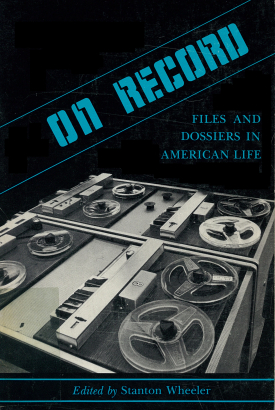
On Record
About This Book
On Record provides descriptive accounts of record keeping in a variety of important organizations: schools, from elementary to graduate school; consumer credit agencies, general business organizations, and life insurance companies; the military and security agencies; the Census Bureau and the Social Security Administration; public welfare agencies, juvenile courts, and mental hospitals. It also examines the legal status of records. The authors pose questions such as the following: Who determines what records are kept? Who has access to the records?
STANTON WHEELER is professor of law and sociology at Yale University.
CONTRIBUTORS: Rodolfo Alvarez, Pierce Baker, Ivar Berg, Nancy Bordier, David Caplovitz, Burton R. Clark, Kai T. Erikson, Daniel E. Gilbertson, Abraham S. Goldstein, David A. Goslin, Adwin M. Lemert, Roger M. Lemert, Roger W. Little, Wilbert E. Moore, Jesse Orlansky, H. Laurence Ross, James Rule, James Salvate, Joseph Steinberg, Stanton Wheeler, Don H. Zimmerman.
Download
RSF Journal
View Book Series
Sign Up For Our Mailing List
Apply For Funding
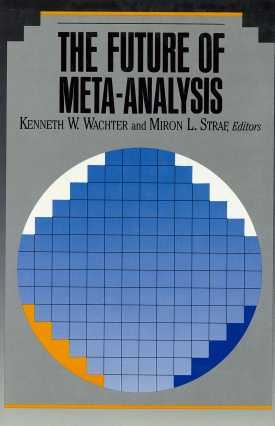
The Future of Meta-Analysis
About This Book
Scientific progress often begins with the difficult task of preparing informed, conclusive reviews of existing research. Since the 1970s, the traditional "subjective" approach to research reviewing in the social sciences has been challenged by a statistical alternative known as meta-analysis. Meta-analysis provides a principled method of distilling reliable generalizations from previous studies on a single topic, thereby providing a quantitative and objective background for future research.
The Future of Meta-Analysis brings together expert researchers for an in-depth examination of this new methodology—not to promote a consensus view but rather to explore from several perspectives the theories, tensions, and concerns of meta-analysis, and to illustrate through concrete examples the rationale behind meta-analytic decisions.
In a meta-analysis prepared especially for this volume, a statistician and a psychologist review the existing literature on aphasia treatment. In a second study, experts analyze six still-unpublished meta-analyses sponsored by the National Institute of Education to investigate the effects of school desegregation on the academic achievement of black children. This unique case study approach provides valuable discussion of the process of meta-analysis and of the current implications of meta-analysis for policy assessment.
Prepared under the auspices of the National Research Council, The Future of Meta-Analysis presents a forum for leaders in this rapidly evolving field to discuss salient conceptual and technical issues and to offer a new theoretical framework, further methodological guidance, and statistical innovations that anticipate a future in which meta-analysis will play an even more effective and valuable role in social science research.
KENNETH W. WACHTER is professor of demography and statistics at the University of California, Berkeley.
MIRON L. STRAF is director of the Committee on National Statistics for the National Research Council of the National Academy of Sciences.
CONTRIBUTORS: Kenneth W. Wachter, Miron L. Straf, Ingram Olkin, Larry V. Hedges, Joel B. Greenhouse, Davida Fromm, Satish Iyengar, Mary Amanda Dew, Audrey L. Holland, Robert E. Kass, Nan M. Laird, Jeffrey M. Schneider, Linda Ingram, S. James Press, Harris M. Cooper, David S. Cordray, Robert Rosenthal, Norman M. Bradburn, Fredric M. Wolf, Donald B. Rubin, and Frederick Mosteller.
RSF Journal
View Book Series
Sign Up For Our Mailing List
Apply For Funding
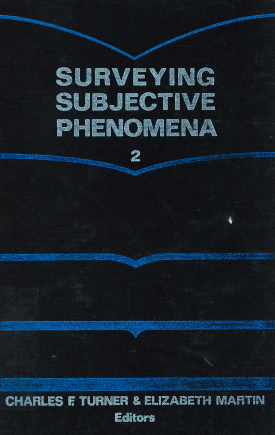
Surveying Subjective Phenomena, Volume 2
About This Book
In January 1980 a panel of distinguished social scientists and statisticians assembled at the National Academy of Sciences to begin a thorough review of the uses, reliability, and validity of surveys purporting to measure such subjective phenomena as attitudes, opinions, beliefs, and preferences. This review was prompted not only by the widespread use of survey results in both academic and non-academic settings, but also by a proliferation of apparent discrepancies in allegedly equivalent measurements and by growing public concern over the value of such measurements.
This two-volume report of the panel’s findings is certain to become one of the standard works in the field of survey measurement. Volume I summarizes the state of the art of surveying subjective phenomena, evaluates contemporary measurement programs, examines the uses and abuses of such surveys, and candidly assesses the problems affecting them. The panel also offers strategies for improving the quality and usefulness of subjective survey data. In volume II, individual panel members and other experts explore in greater depth particular theoretical and empirical topics relevant to the panel’s conclusions.
For social scientists and policymakers who conduct, analyze, and rely on surveys of the national state of mind, this comprehensive and current review will be an invaluable resource.
CHARLES F. TURNER is professor of Applied Social Research at the City University of New York.
ELIZABETH MARTIN is research associate at the National Research Council.
CONTRIBUTORS: Robert P. Abelson, Barbara A. Bailar, Marian Ballard, Theresa J. Demaio, Otis Dudley Duncan, Baruch Fischhoff, Lester R. Frankel, William H. Kruskal, Michael B. Mackuen, Catherine Marsch, Elizabeth Martin, Sara B. Nerlove, Howard Schuman, Tom W. Smith, Charles F. Turner
Download
RSF Journal
View Book Series
Sign Up For Our Mailing List
Apply For Funding
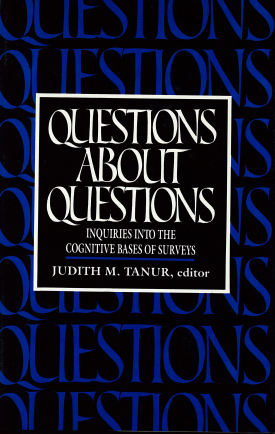
Questions About Questions
About This Book
The social survey has become an essential tool in modern society, providing crucial measurements of social change, describing social life, and guiding government policy. But the validity of surveys is fragile and depends ultimately upon the accuracy of answers to survey questions. As our dependence on surveys grows, so too have questions about the accuracy of survey responses.
Authored by a group of experts in cognitive psychology, linguistics, and survey research, Questions About Questions provides a broad review of the survey response problem. Examining the cognitive and social processes that influence the answers to questions, the book first takes up the problem of meaning and demonstrates that a respondent must share the survey researcher’s intended meaning of a question if the response is to be revealing and informative. The book then turns to an examination of memory. It provides a framework for understanding the processes that can introduce errors into retrospective reports, useful guidance on when those reports are more or less trustworthy, and investigates techniques for the improvement of such reports. Questions about the rigid standardization imposed on the survey interview receive a thorough airing as the authors show how traditional survey formats violate the usual norms of conversational behavior and potentially endanger the validity of the data collected.
Synthesizing the work of the Social Science Research Council’s Committee on Cognition and Survey Research, Questions About Questions emphasizes the reciprocal gains to be achieved when insights and techniques from the cognitive sciences and survey research are exchanged.
"these chapters provide a good sense of the range of survey problems investigated by the cognitive movement, the methods and ideas it draws upon, and the results it has yielded." —American Journal of Sociology
JUDITH M. TANUR is professor of sociology at the State University of New York at Stony Brook. She is co-chairperson of the Social Science Research Council Committee on Cognition and Survey Research.
CONTRIBUTORS: Robert P. Abelson, Herbert H. Clark, Robert T. Croyle, Robyn M. Dawes, Cathryn S. Dippo, Jack F. Dovidio, Russell H. Fazio, Judith Fiedler, Ronald P. Fisher, Nancy H. Fultz, Anthony G. Greenwald, Robert Groves, Brigitte Jordan, Mark Klinger, Jon A. Krosnik, Elizabeth F. Loftus, Elizabeth Martin, Janet L. Norwood, Robert W. Pearson, Kathryn L. Quigley, Michael Ross, Michael F. Schober, Kyle D. Smith, Lucy Suchman, Judith M. Tanur.
RSF Journal
View Book Series
Sign Up For Our Mailing List
Apply For Funding
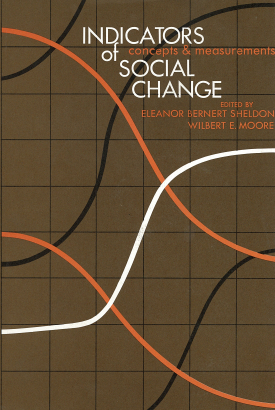
Indicators of Social Change
About This Book
Includes many original contributions by an assembly of distinguished social scientists. They set forth the main features of a changing American society: how its organization for accomplishing major social change has evolved, and how its benefits and deficits are distributed among the various parts of the population. Theoretical developments in the social sciences and the vast impact of current events have contributed to a resurgence of interest in social change; in its causes, measurement, and possible prediction. These essays analyze what we know, and examine what we need to know in the study, prediction, and possible control of social change.
DR. ELEANOR BERNERT SHELDON and DR. WILBERT E. MOORE are both sociologists on the professional staff of the Russell Sage Foundation. They share a common background in demography and a common current interest in the measurement of large-scale structural change. Both have written extensively in various other sociological specialties, and participated in the ongoing activities of their common profession.
CONTRIBUTORS Daniel Bell, N.J. Demerath III, Beverly Duncan, Otis Dudley Duncan, Philip H. Ennis, William J. Goode, Stanley Lebergott, Ida C. Merriam, Joyce M. Mitchell, William C. Mitchell, Wilbert E. Moore, Iwao M. Moriyama, Milton Moss, A.W. Sametz, Conrad Taeuber.
RSF Journal
View Book Series
Sign Up For Our Mailing List
Apply For Funding
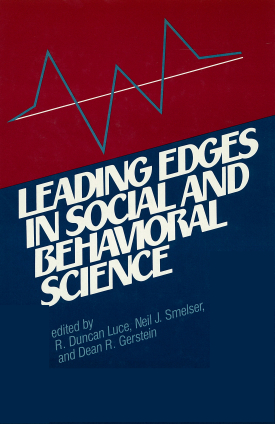
Leading Edges in Social and Behavioral Science
About This Book
The reach of the social and behavioral sciences is currently so broad and interdisciplinary that staying abreast of developments has become a daunting task. The thirty papers that constitute Leading Edges in Social and Behavioral Science provide a unique composite picture of recent findings and promising new research opportunities within most areas of social and behavioral research. Prepared by expert scholars under the auspices of the National Academy of Sciences, these timely and well-documented reports define research priorities for an impressive range of topics:
Part I: Mind and Brain
Part II: Behavior in Social Context
Part III: Choice and Allocation
Part IV: Evolving Institutions
Part V: Societies and International Orders
Part VI: Data and Analysis
R. DUNCAN LUCE is Distinguished Professor of Cognitive Science and director of the Irvine Research Center in Mathematic Behavioral Science at the University of California, Irvine.
NEIL J. SMELSER is University Professor of Sociology at the University of California, Berkeley.
DEAN R. GERSTEIN is study director at the National Research Council, National Academy of Sciences.
CONTRIBUTORS: Norma Graham, Linda Bartosik, Albert S. Bregman, Julian Hichberg, Azriel Rosenfeld, Michael Studdert-Kennedy, R. Duncan Luce, Richard Thompson, Carol Barnes, Thomas Carew, Lon Cooper, Michela Gallagher, Michael Posner, Robert Rescola, Daniel Schachter, Larry Squire, Alan Wagner, Saul Steinebers, Fergus I.M. Clark, John Jonedes, Walter Kinsch, Stephen M. Kosslyn, James L. McClelland, Raymond S. Nickerson, James Greeno, Frederick J. Newmeyer, Antonio R. Damasio, Merrill Garrett, Mark Lieberman, David Lightfoot, Howard Poizner, Thomas Roeper, Eleanor Saffran, Ivan Sag, Victoria Fromkin, Herbert Pick, Ann L. Brown, Carol Dweck, Robert Emde, Frank Keil, David Klahr, Ross S. Parke, Steven Pinker, Rochel Gelman, David S. Krantz, Leonard Epstein, Norman Garmezy, Marcha Ory, Leonard Perlin, Judith Rodin, Marvin Stein, John F. Kihlstrom, Ellen Berscheid, John Darley, Reid Hastie, Harold Kelley, Sheldon Stryker, Edward E. Jones, Nancy M,. Henley, Rose Laub Cosner, Jane Flax, Naomi Quinn, Kathryn Rish Sklar, Sherry B. Ortner, Alfred Blumstein, Richard Berk, Philip Cook, David Farrington, Samuel Krislov, Albert J. Reiss Jr., Franklin Zimring, William Riker, James S. Coleman, Bernard Grofman, Michael Hechter, John Ledyard, Charles Plott, Kenneth Shepsle, John Ferejohn, Mark Machina, Robin Hogarth, Kenneth MacCrimmon, John Roberts, Alvin Roth, Paul Slovic, Rihard Thaler, Oliver Williamson, Jerry Hausman, Paul Joskow, Roger Noll, Vernon Smith, David Wise, Stanley Reiter, Kenneth Arrow, Lance Davis, Paul Dimaggio, Mark Granovetter, Jerry Green, Theodore Groves, Michael Hannan, Andrew Postlewaite, Roy Radner, Karl Shell, Leonid Hurwicz, Frank Stafford, Jamoes Baron, Danier Hamermesh, Christopher Jencks, Ross Stolzenberg, Donald J. Treiman, Stanley Fischer, William Beeman, Rudiger Dornbusch, Thomas Sargent, Robert Schiller, Lawrence Summers, Glynn Isaac, Robert Blumenschine, Margaret Conkey, Terry Deacon, Irven Devore, Peter Ellison, Richard Milton, David Pilbeam, Richard Potts, Kathy Schick, Margaret Schoeninger, Andrew Sillen, John Speth, Nicholas Toth, Sherwood Washburn, Douglas C. North, Robert Bates, Robert Brenner, Elizabeth Colson, Kent Flannery, Vernon Smith, Neil Smelser, Samuel Preson, Ansley Coale, Kingsley Davis, Geoffrey McNicoll, Jane Menken, T. Paul Schultz, Daniel Vining, John Modell, Margaret Clark, William Goode, William Kessen, Robert Willis, John Quigley, Alex Anas, Geoffrey Hewings, Risa Palm, James Fernandez, Keith Basso, Karen Blu, Kenneth Boulding, Stepher Gudeman, Michael Kearney, Goerge Marcus, Dennis McGilvary, Emiko Ohnuki-Tierney, William Sewell, Daniel H. Levine, Leonard Binder, Thomas Bruneau, Jean Comaroff, Susan Harding, Charles Keyes, Robert Wuthnow, Dorothy Nelkin, Charles Rosenberg, Theda Skocpol, Martin Bulmer, Thomas Joster, Donald McCloskey, Arnold Thackeray, Carol Weiss, Peter Evans, Bruce Cumings, Albert Fishlow, Peter Gourevitch, John Meyer, Alejandro Portes, Barbara Stallings, Robert Jervis, Josh Lederberg, Robert North, Steven Rosen, Dina Zinnes, Warren Miller, Martin David, James Davis, Bruce Russett, Kimball Romney, Norman Bradburn, J. Douglas Carol. Roy D'Andrade, Jean Claude Falmagne, Paul Holland, Lawrence Hubert, Edward E. Leamer, John W. Pratt, Cliffors C. Clogg, Bert F. Green, Michael Hannan, Jerry A. Hausman, William H. Kruskal, Donald B. Rubin, I. Richard Savaga, John W. Turkey, Kenneth W. Wachter, Leo A. Goodman.
Download
RSF Journal
View Book Series
Sign Up For Our Mailing List
Apply For Funding
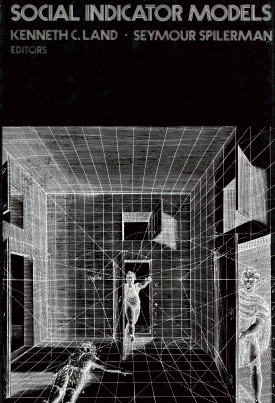
Social Indicator Models
About This Book
Deals in comprehensive fashion with a diverse array of objective and subjective social indicators and shows how these indicators can be used, potentially, to inform and perhaps guide social policy. Written with clarity and authority, it will be of paramount interest to those concerned with the interpretation and analysis of social indicators and to those interested in their use. For the former, it serves as an illuminating introduction to some of the analytical tasks that lie ahead in the study of social indicators. For the latter, it provides a solid foundation upon which future policy analysis may be based.
KENNETH C. LAND is associate professor of sociology at the University of Illinois, Urbana.
SEYMOUR SPILERMAN is professor of sociology at the University of Wisconsin, Madison.
CONTRIBUTORS: James S. Coleman, James A. Davis, Beverly Duncan, Otis Dudley Duncan, Mark Evers, David L. Featherman, Robert M. Hauser, Kenneth C. Land, Judah Matras, David D. McFarland, Aage B. Sorenson, Seymour Spilerman, Arthur L. Stinchcombe, Richard Stone, Kermit Terrell, Donald J. Treiman, James C. Wendt, H.H. Winsborough.
Download
RSF Journal
View Book Series
Sign Up For Our Mailing List
Apply For Funding

Marginalism and Discontinuity
About This Book
Marginalism and Discontinuity is an account of the culture of models employed in the natural and social sciences, showing how such models are instruments for getting hold of the world, tools for the crafts of knowing and deciding. Like other tools, these models are interpretable cultural objects, objects that embody traditional themes of smoothness and discontinuity, exchange and incommensurability, parts and wholes.
Martin Krieger interprets the calculus and neoclassical economics, for example, as tools for adding up a smoothed world, a world of marginal changes identified by those tools. In contrast, other models suggest that economies might be sticky and ratchety or perverted and fetishistic. There are as well models that posit discontinuity or discreteness. In every city, for example, some location has been marked as distinctive and optimal; around this created differentiation, a city center and a city periphery eventually develop. Sometimes more than one model is applicable—the possibility of doom may be seen both as the consequence of a series of mundane events and as a transcendent moment. We might model big decisions or entrepreneurial endeavors as sums of several marginal decisions, or as sudden, marked transitions, changes of state like freezing or religious conversion.
Once we take models and theory as tools, we find that analogy is destiny. Our experiences make sense because of the analogies or tools used to interpret them, and our intellectual disciplines are justified and made meaningful through the employment of characteristic toolkits—a physicist's toolkit, for example, is equipped with a certain set of mathematical and rhetorical models.
Marginalism and Discontinuity offers a provocative and wide-ranging consideration of the technologies by which we attempt to apprehend the world. It will appeal to social and natural scientists, mathematicians and philosophers, and thoughtful educators, policymakers, and planners.
MARTIN H. KRIEGER is associate professor of planning at the School of Urban and Regional Planning, University of Southern California.
RSF Journal
View Book Series
Sign Up For Our Mailing List
Apply For Funding
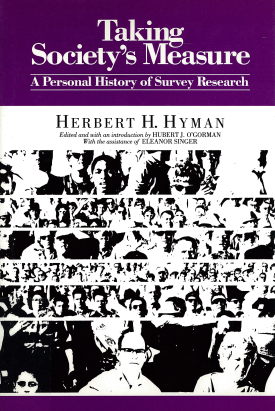
Taking Society's Measure
About This Book
How are we, as members of a society, informed of conditions that affect our social welfare? How does the government register the impact of its actions on its citizens? The turbulent 1930s saw the emergence of sample survey research as an increasingly valuable technique of social inquiry. Perhaps no one championed this nascent discipline as vigorously as Herbert Hyman, one of those pioneering investigators whose talents were so closely associated with the rapid growth of survey research that their professional careers and reputations became virtually indistinguishable from the field itself.
Hyman’s personal account is a remarkable contribution to the history and sociology of social research. His experiences with the U.S. Department of Agriculture, the Office of War Information, the U.S. Bombing Surveys of Germany and Japan, the National Opinion Research Center, and the Bureau of Applied Social Research are all documented with fascinating insight into the critical events and prominent individuals that shaped the field of survey research between the late 1930s and the late 1950s.
The late HERBERT H. HYMAN retired from Wesleyan University in 1983 as Professor of Sociology Emeritus.
HUBERT O'GORMAN was, until his untimely death, professor of sociology at the same university.
ELEANOR SINGER is senior research scholar at the Center for the Social Sciences at Columbia University.
Download
RSF Journal
View Book Series
Sign Up For Our Mailing List
Apply For Funding
Pagination
- Previous page
- Page 9
- Next page
